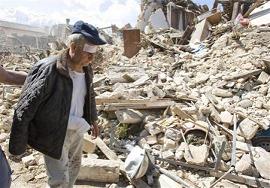Bill Menke's BLOG Page: Prediction Predicament.

aftermath of the quake
|
Very few of my fellow seismologists seem to have any sympathy for
Giampaolo Giuliani, the technician at Italy's National Institute
of Nuclear Physics who made an earthquake prediction a month or
so before an actual earthquake devistated the town of L'Aquila
in central italy and killed 293 people. Giuliani was indicted
a couple of days before the April 6, 2009 quake for "spreading rumors".
Giuliani's prediction was based on his observing, as part of
his physics lab activities, an increase in the rate of seepage of
radon gas from the ground. But frankly, I know very little about
his prediction, because he was forced to withdraw all information
about it from public view.
|
Giuliani's use of radon in an earthquake forcasting setting is by
no means unique. Seismologists have monitored it on and off for
the last thirty years, hoping that it would have predictive value,
but with equivocal results. In a few cases, such as with an
earthquake in Iceland* in 2000, radon levels spiked a few months before
the quake. In many other cases, no such premonitory signal occurs.
With no access to the details, I have no way of assessing the
credibility of Giuliani prediction.
Nevertheless, I believe that Italian authorities would have done
well to have given Giuliani's prediction a formal evaluation by a board of
scientists specifially charged to recommend an appropriate official
response. The US has such an entity,
the National Earthquake Prediction Evaluation Council. Not withstanding
claims made to the press by my fellow scientists, that earthquake
predictions are made all the time, (and presumably by kooks), this
Council has evaluated only a handful of predictions in its twenty year
history, all made by people with arguably-relevant credentials.
Many of my colleages also have used the opportunity to assert the
impossibility of earthquake prediction. Now I'll be the first to
agree that we do not know how to predict earthquakes. And I'll even
agree that earthquake prediction has proven to be a very hard problem.
But we don't know that it's impossible. Until we have some sort of
rigorous proof that it is impossible, I believe that we should
keep on trying.
Some of my colleages have also decried expenditures on prediction
efforts, which are after all not a sure thing, when techniques for
improving earthquake preparedness (e.g. reinforcing buildings) are
well-developed and have demonstrable value. Rather than argue this
point, I will note that medical researchers are still eager to
pursue AIDS vaccine research, even though they are all aware that
HIV transmission prevention techniques (e.g. abstinence, condoms) are widely
available, and even though many acknowledge progress towards an
effective vaccine to be slow. And perhaps they will be up to the
challenge.
I will make my own prediction, of sorts. If someone ever
discovers how to predict earthquakes, he or she will not be a
seismologist. We seismologist's just aren't trying hard enough.
*Einarsson, P. et al, Radon Changes Associated with the Earthquake
Sequence in June 2000 in the South Iceland Seismic Zone, Pure and
Applied Geophysics 165, 63-74, 2008.